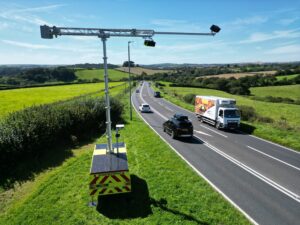The UK head of Australian AI road safety company Acusensus is welcoming the Government’s commitment to deliver tougher enforcement against people using hand-held mobile phones while driving.
In Secretary of State Mark Harper’s plan, the Government says: “We know drivers are concerned by the use of handheld mobile phones at the wheel and aggression on the part of other road users – and there is widespread support among drivers for tougher enforcement against those who endanger others.”
Geoff Collins, UK General Manager of Acusensus welcomed the commitment, but added that he would like to see more detail about how the Government plans to deliver the pledge.
“We know from surveys that the vast majority of drivers understand that using a phone at the wheel is incredibly dangerous, and it’s something that angers them when they see others doing it,” Mr Collins explained. “The Government’s own research found you are four times more likely to be in a crash if you use your phone, and your reaction times are three times slower than drink drivers if you’re using it handheld”.
Acusensus has developed cameras harnessing AI technology to learn driver behaviour, so when driving past a monitoring site, it can analyse images taken through the windscreen to flag up if the driver is holding a mobile phone. This is then passed for human review to confirm if a violation has taken place.
“There’s no question that the technology works, both in terms of detection but also improving behaviours and safety.” Mr Collins continued. “In Australia, the first state-wide scheme rolled out in New South Wales in 2019 has had a significant impact on driver behaviour as people discovered that the technology existed and they face the real prospect of being caught if they broke the rules. The number of mobile phone detections have dropped by a factor of six, from 1 in 82 drivers in 2019 to 1 in 478 drivers in 2021.”
Acusensus are currently working with consultants AECOM to trial the technology in the UK, using a fleet of camera vans and trailers to monitor sections of road across the country. “The results have been good, and also bad,” Mr Collins explained. “We have found the technology is extremely good at spotting offenders, but the bad news is there are many, many more offenders out on the roads than previously thought, and that is putting other, responsible drivers at risk. This proves more needs to be done.”
The Acusensus technology also spots people driving without wearing a seatbelt, and previous studies detected hundreds of offences in the height of the tourist season on one of Cornwall’s busiest roads.
“I hope the Government really does deliver what it says it will deliver on phone use at the wheel,” Mr Collins concluded. “Distracted driving costs lives, and there are a range of ways technology can help the police to tackle it. Some selfish drivers will claim automated enforcement is somehow a “war on the motorist”. It is not – it is fighting a war on bad and dangerous driving, and – when I think of the 30 people each week who we lose in road crashes – this is a war everyone should be supporting.”
(Picture – Acusensus/National Highways)























